Posts Tagged ‘World Relief Burundi’
Breaking Barriers in Burundi: Women Who Make It Happen
Leocadie is a leader in so many ways. She’s a farmer, a wife, a mother to eight children and a grandmother of 20 — two of whom, she proudly says, are a set of twins who were born this past February.
For most of her life, though, Leocadie says women weren’t welcomed into leadership roles within the community nor were they empowered to be a part of making decisions for their families. But that began to change in 2010 when World Relief launched a savings program in her community and invited women, like her, to lead.
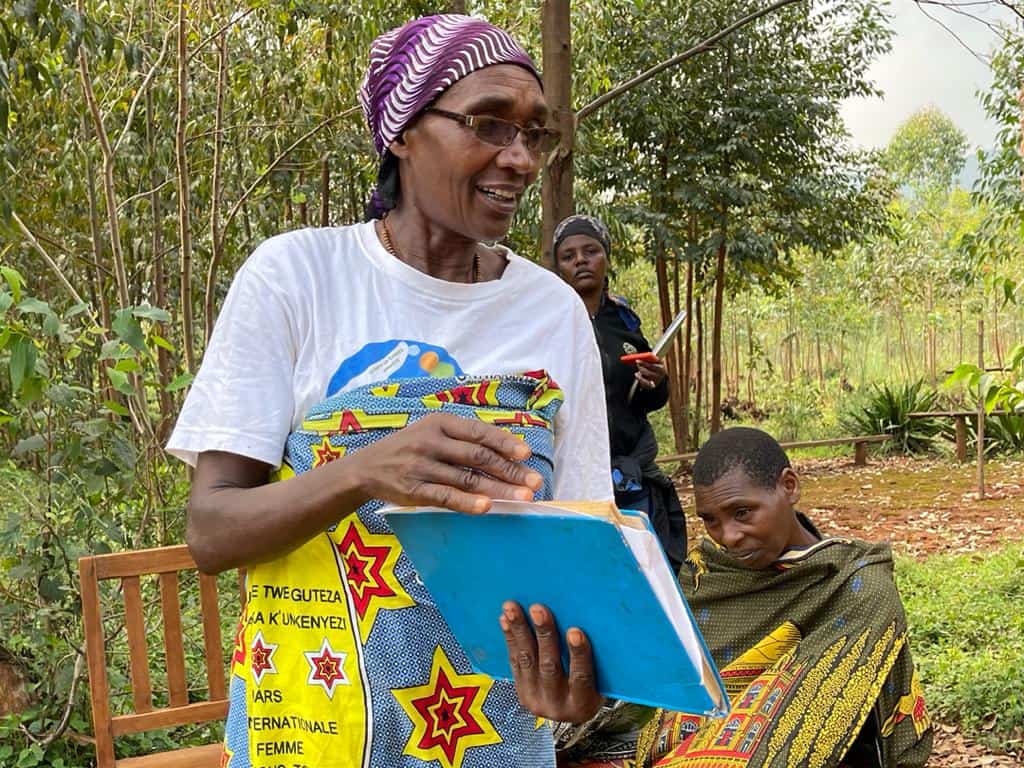
“When our group was formed I was elected to lead them. I took it as a privilege,” she said. “I was inspired by the interventions that [World Relief] was conducting because I saw them as a way to help others in my community who were going through many issues within their families.”
Over the next 11 years, Leocadie continued to grow as a leader. When World Relief launched agricultural programming in her community, she stepped up to lead in this area as well. And while the economic advancements she and her group have made by implementing new agricultural techniques and better financial management, the transformation her community has experienced in the area of gender equality is equally as remarkable.
“In the past, women were supposed to stay home and take care of the family, with their time mostly spent in the kitchen,” she said. “Now we participate in all decisions, at the colline (community) level. We have female leaders, savings group female leaders. I am very happy to see how I am respected by women and men. They listen to me because they see the impact of what I am doing.”
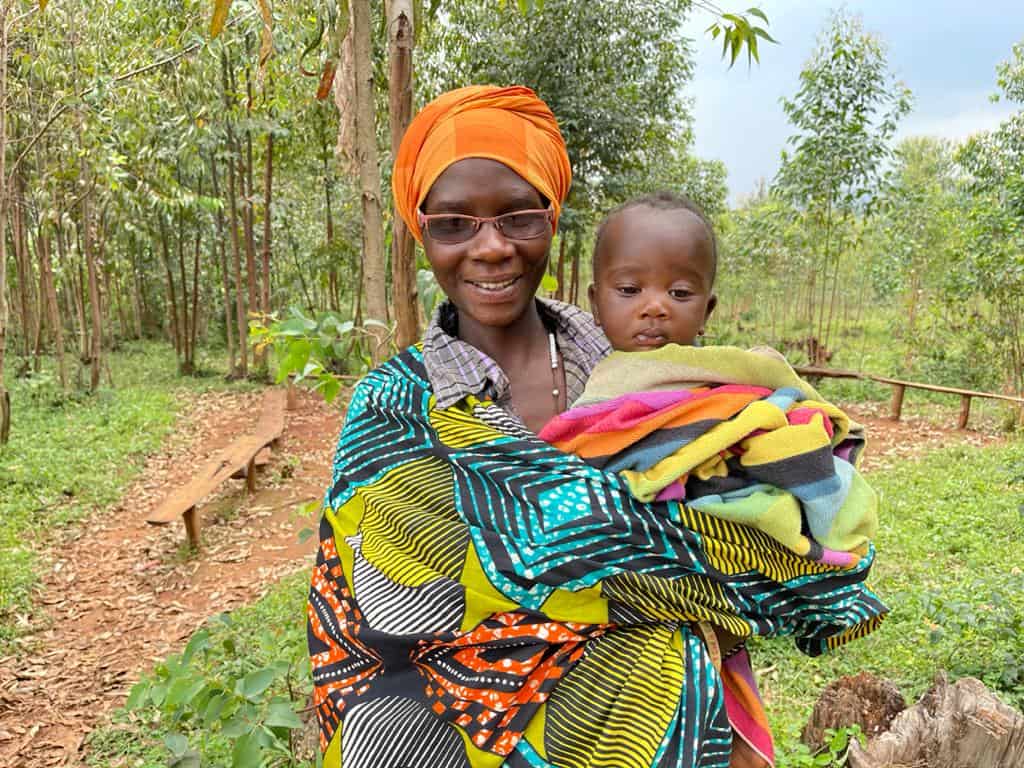
Leocadie’s leadership is rippling throughout her community. She’s created a sense of connectedness and support for women in her group like Jeane, the youngest member of the group, who says that learning from Leocadie has helped her grow as a mother and has improved her marriage.
“I am very happy to be part of this group,” Jeane said. “I am one of the youngest with two little children. I get an opportunity to be with wise women, grannies. Group members opened the door for me to learn from their marriages. As a result, I know how to be a better woman, and my husband and I discuss our feelings and make decisions together. ”
And it’s not just the women who are experiencing transformation. Pasteur Sinzumusi, the lone man in the group of 24 women, has increased his income, improved his marriage and totally shifted the way he views women thanks to Leocadie’s leadership.
Pasteur initially joined the group because he noticed the women were experiencing a better crop yield than he was.
“Before joining them, I had no savings at all,” he said. “I was farming in old fashion (outdated techniques), which did not have a good harvest. The reason I joined is because I saw their lives were different from mine. They had new skills and knowledge in farming, so I approached them.”
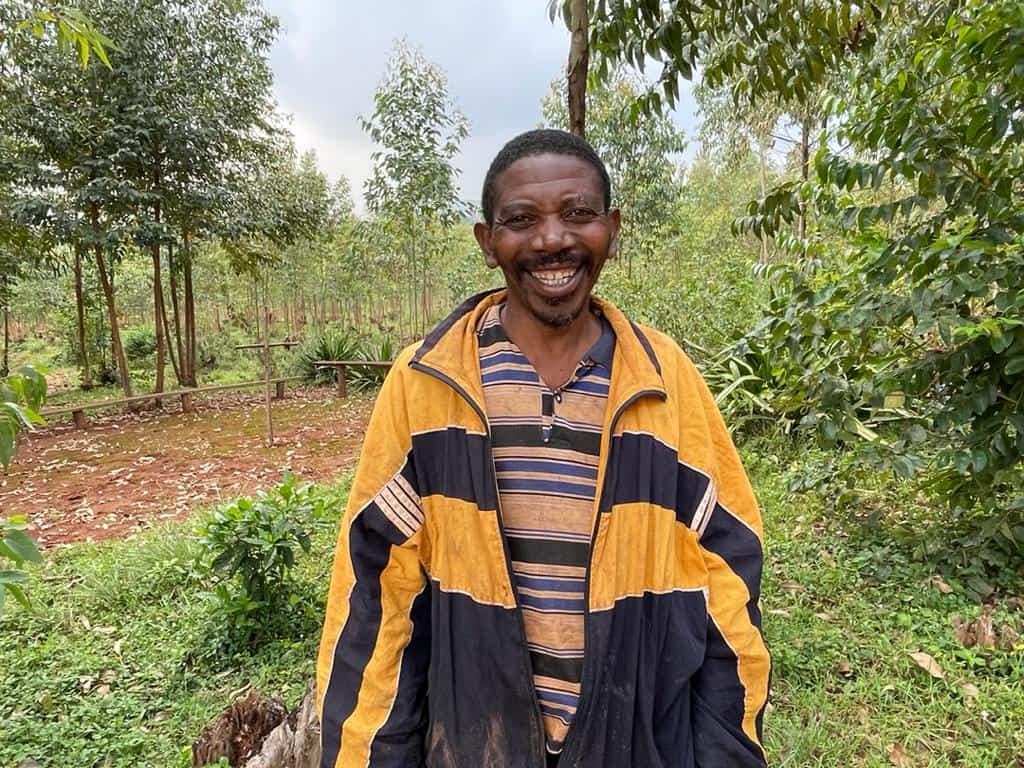
Today, Pasteur says his plot of land looks amazing, his income has increased and he can now easily afford to buy necessities like soap and send his kids to school. He attributes much of his success to the leadership of Leocadie and the community of women he has learned alongside.
“I respect my leader. She is just amazing. She does her duties well. Through her leadership, my way of viewing women has changed. Before I thought they couldn’t lead, but now I can testify that women are capable of leading. And this made me respect my wife and let her step into exercising her gifts.”
Leocadie is grateful for all the ways she’s seen her community transform. Women are more involved in community associations; marriages are more egalitarian in their decision-making; women participate in household management and can contribute financially.
She is hopeful to see her group continue to improve their farming and embrace new skills.
As we celebrate the accomplishments of women and the barriers they are breaking down, we echo the words of Pasteur when he said: “Women can do things as men. I invite all men to come to see how our association is well organized and well managed by female leadership. They will learn that women are good and great leaders.”
Millions of women, just like Leocadie, are choosing to challenge the limits placed on them and break through the barriers around them. Their daughters, granddaughters and great-granddaughters will know a world where women are respected, valued and lead. Will you join them in building a better world by giving today?
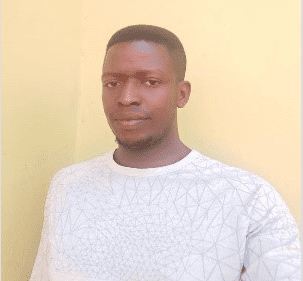
Ezechiel Hatungimana born and raised in Burundi with a passion of seeing his country developed holistically. Prior to World Relief, Ezechiel has served in a local organization aiming to empower the lives of people holistically, working directly with churches. While he is still completing his bachelor’s degree in Business Administration, He joined WR 2018 and he supervises a team of 20 people who equip 500 local churches. Ezechiel is married and blessed with two children. Ezechiel and his Family worship at PTI Church where he serves as a preacher.

Rachel Clair serves as a Content Writer at World Relief. With a background in creative writing and children’s ministry, she is passionate about helping people of all ages think creatively and love God with their hearts, souls and minds.
Change: Reimagining the Future for Families
This new year, we’re making space to reimagine the future and build a better world together. In the final post in our Made for Change series, Joanna Kretzer Chun and Debbie Dortzbach recount the way World Relief staff reimagined their approach to HIV prevention.
This reimagining led to the creation of a new program known as Families for Life. Families for Life is a couple-strengthening curriculum that continues to be adapted and reimagined in countries around the world.
“Vulnerability is the birthplace of innovation, creativity and change.”
― Brene Brown
A Quandary
In 2011, World Relief staff were faced with a quandary. We were in the middle of partnering with a church in India to start a typical HIV awareness and prevention workshop. Although there had been a decrease in HIV cases across India, the rates in 2011 were still quite high. In spite of governmental efforts as well as those of World Relief and other organizations like it, we weren’t seeing the results we had hoped to see.
I (Debbie) remember being kept up at night feeling disturbed that we weren’t making progress. I was at a loss for how to make the workshop more engaging and effective. But all that changed one day when I was riding on the train.
I remembered a report that told the story about how truck drivers in India were motivated to change their behaviors, not because they were afraid of contracting HIV but because they wanted to return to their families.
That little word “family” stuck out to me, and I wondered, “If this is what is motivating truck drivers to change their behaviors, why aren’t we using that as a motivator in our churches to prevent HIV and strengthen families?”
Surely the strengthening of families was something the church was called to do.
I shared these thoughts with some other team members, and that day on the train we began dreaming about what this new program could be. Change can feel vulnerable and unknown. But we knew that in order to foster greater programming effectiveness, we’d need to embrace a change, and thus the Families for Life (FFL) model was born within World Relief.
A New Way Forward
Implementation in India quickly showed that this new idea for engaging couples to spark behavior change was a huge success and filled a gap that no one else had been addressing. We soon realized that FFL could not only be effective in preventing HIV but also in helping couples address other critical issues like marital conflict and even domestic violence.
Groups began multiplying organically within churches and the wider community in southern India to meet the demand, and over time FFL blossomed, expanding out to an additional six countries, reaching thousands of couples across the globe.
At its core FFL seeks to strengthen the couple relationship as a foundation for a healthy family and calls for participants to be open to change and reimagine their futures together.
Using a combination of story, scripture, interactive discussion and personal reflection, these FFL groups go through a journey of growth together. Couples learn important skills like valuing one another, communication and problem-solving as a foundation to adapt to life circumstances and different seasons of life.
As couples work through our scripture-based curriculum, harmful beliefs about marriage and family begin to shift. Gender-based violence, alcoholism, poverty, abuse and unfaithfulness decline. Husbands begin to include their wives in everyday decisions; wives are empowered to contribute to their families’ economic growth; parents come to realize the value of educating both girls and boys; families begin intentionally planning for their futures.
Reimagining Again and Again
Families for Life is a unique model in that it can be reimagined again and again to meet the needs of a particular community, growing with that community as couples reimagine the future for their families.
Recently, in Burundi, we reimagined FFL to meet an unmet need for Family Planning. The curriculum was adapted to include information on family planning in order to prompt conversations around healthy timing and spacing of births.
This adaptation, while small, sparked new collaboration between couples, church leaders and community health workers, seeking to increase use of family planning services to reach 120,884 beneficiaries including 9,600 couples and their children. This adaptation has been successful in cultivating a trusted partnership between couples and community health workers and church leaders leading to a stronger demand for family planning services in the community.
In Haiti, we learned that one church network we worked with began hosting couples events that included games nights and all-night worship events. Once a month these churches host a family Sunday where pastors create sermons from the FFL manual. This is a community where we are no longer working, but the fruits of FFL continue to grow.
In Haiti, we learned that one church network we worked with began hosting couples events that included games nights and all-night worship events. Once a month these churches host a family Sunday where pastors create sermons from the FFL manual. This is a community where we are no longer working, but the fruits of FFL continue to grow.
Being open to change takes courage. This is true on a personal level for the couples we come alongside, but it’s also true for organizations seeking to implement effective programs. Knowing that change can lead to growth and even larger impact, World Relief continues to innovate and reimagine the future for couples and communities across the globe.
Give today, and join us as we reimagine the future alongside couples and communities across the globe.
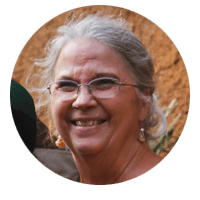
Debbie Dortzbach was privileged to raise her family in Kenya and spent most of her professional career in community health non-formal education training. During her many years working with World Relief, she helped to create and build the Families for Life model. She recently left full time work with World Relief and now enjoys reflecting, writing, serving her grandchildren, consulting, and advising.
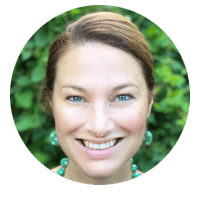
As the Director of the Program Resource Team, Joanna Kretzer Chun leads a team of global technical advisors that support World Relief international programs spanning Health and Nutrition, Savings, Agriculture, Child Development and Protection, and Couples’ Strengthening. With over fifteen years of international development experience, Joanna’s programming background spans the areas of gender mainstreaming, women’s empowerment, child protection, child development, faith leader engagement, and social norm change. Joanna holds Master degrees in Intercultural Studies and Family Studies from Fuller Seminary and a BA in Foreign Affairs from the University of Virginia. She resides with her family in Washington, DC.
Unseen Hope
As we round the corner of 2020 toward the end of the year, we’re bringing you more made-for-change stories from across the World Relief community.
Today, Amberle Brown, World Relief’s MEL Advisor and Disability Inclusion Focal Point at World Relief, shares her story of living with a disability and how God is using her experience to bring disability inclusion training to World Relief’s global programs. Amberle’s story reminds us that change hopes because God is faithful.
A Lost Dream
The warm breeze carried the voices of the practicing church choir through the window of our office. I was sitting in a circle with a dozen of my colleagues in Burundi, discussing our plans to reach people with disabilities with the health, child development and economic development programming in our nearby Church Empowerment Zone. This was the life I had hoped for since I was a child, but I had no idea of the hopelessness I would have to endure to get here.
When I was seven, I told my parents (to their horror) that I wanted to be a martyr when I grew up. Eventually, I toned that down and declared that I wanted to be a missionary when I grew up. From that young age, all the decisions I made were centered on my goal of becoming a missionary: I became a nurse as an avenue to serve in closed countries, I spent summers abroad, I even refused to date boys who didn’t also want to be missionaries.
But a few weeks after I turned 21, I was admitted to a burn ICU for toxic epidermal necrolysis (TENS) – an extremely rare allergic reaction that affects 1 in 2.5 million people – and kills one in three who have it. There is no established treatment for TENS – doctors must sit by as the patient’s body attacks itself, causing skin and organs to lose their linings like a burn.
Over the next month, I lost 95% of my skin and the lining of organs including my lungs and eyes. As my flesh melted away, so did my hopes of being a missionary in a remote part of the world. By God’s grace, I hardly remember any of that month, as a machine forced air into my decaying lungs and artificial bandages served as the barrier between me and the world. When I left the hospital, my eyes were severely scarred, making the world a blur.
And though I could see people like shadows, I was left with a much deeper pain – a pain of not understanding why God would give me a dream and then take away what I felt was my ability to fulfill that dream as I envisioned it.
Pieces of Hope
As I learned how to live with a disability, I also discovered more about the global situation of people with disabilities: Around the world, people with disabilities are twice as likely to live in poverty; they are more likely to be hungry, have poor health, lack education and be victims of violence; and only 5% of the 1 billion people with disabilities in the world have ever heard the gospel.
And yet, because of physical, communication and attitudinal barriers, people with disabilities are far more likely to be left out of the very efforts intended to foster their thriving.
But in these seemingly hopeless discoveries, God began to restore broken pieces of my hope. For the first time I noticed a Jesus who stopped in his tracks for people with disabilities over and over in the gospels. I learned that my vision loss in fact made it easier for me to rely on God rather than my independence. And I found that my disability itself allowed me to notice and break down barriers that most of us overlook.
My experience with disability propelled me and my team to look more closely at World Relief’s efforts to tackle the world’s biggest problems, to assess and dismantle barriers that might have kept people with disabilities from benefiting from our programs, and to partner with pastors to address harmful beliefs and stigma about disability in the countries where we work.
Bringing Hope to Others
Over the past 18 months, Disability Inclusion (DI) has become integral to World Relief’s mission and strategy. Early emphasis in this work has been focused on understanding the contexts where we work, preparing DI tools and equipping staff to begin DI integration in programs.
In total, we’ve engaged more than 3,400 individuals around DI issues, helping change their perspectives and beliefs about people with disabilities, and guiding them on the journey to understand, identify, serve and treat people with disabilities as men and women made in the image of God.
This work has been piloted across several of our programs in Burundi and Malawi, where 693 local leaders have been reached with DI messaging. Our Parenting for Life couple facilitators have also been taught to better understand the unique needs and constraints that parents of children with disabilities face.
Likewise, 1,966 parents (754 in Burundi and 1,212 in Malawi) have been introduced to a new way of thinking around disabilities, helping them change the way they interact with and treat their children, especially those with disabilities. Many have shifted their mindset as a result of these programs; while they might have previously thought that having a disabled child is a curse from God, they now know to celebrate and support children with differing needs and abilities.
Finally, DI is beginning to inform projects on the ground, the decision-making process, and how we meet the needs of our beneficiaries. In Malawi, for example, a project team focused on improving sanitation conditions within schools worked with children with disabilities in the design of latrines to ensure these facilities would be disability-friendly. These are just a few of the exciting initiatives that are beginning to take shape across our international programming.
Today, I thank God for my disability. I thank God that in my vision loss he has given me a new vision for a world where people with disabilities are embraced by the Church, included in development efforts, and valued by their communities. The winds of hope have come over me afresh. I see redemption coming both in my own life, and in the lives of 1 billion other people with disabilities because real Hope is not based on what we see, but on what we don’t yet see.
“For we were saved in hope, but hope that is seen is not hope. For who hopes for that which he sees? But if we hope for that which we don’t see, we wait for it with patience.” Romans 8:24-25
When you give to World Relief, you support programs and initiatives like our Disability Inclusion work in Malawi and Burundi. Join us in bringing transformation to the world’s most vulnerable.
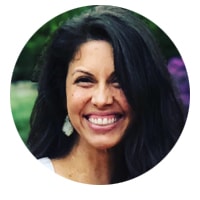
Amberle Brown is the monitoring, evaluation, and learning advisor for WR’s USAID-funded community-based RMNCH work and World Relief’s Disability Inclusion Point Person. Her personal experience with vision loss sparked her passion for disability inclusion, which has led her to work with World Relief to promote disability inclusion across all program sectors and to co-found The Banquet Network, an organization that equips churches to include people with disabilities. Amberle holds an MSN and MPH from Johns Hopkins University and a BSN from Texas Christian University.
World Relief in Burundi: Maternal & Child Health

In Burundi, approximately 58 percent of children under the age of 5 suffer from chronic malnutrition. Malnutrition is associated with serious medical issues later in life as well as lower education attainment, lower earnings and more prevalent violence. It is a result of poor nutritional practices, limited access to food, minimal dietary diversity and chronic illness. Because 80 percent of Burundians live on less than $1.25 per day and have limited access to the most basic financial services, poverty compounds these vulnerabilities and contributes to a cycle of malnutrition in households.
World Relief is empowering the local church to serve the most vulnerable in Burundi and meet the holistic physical, spiritual and relational needs that exist. World Relief provides long-term training and supervision of staff and government officials, who in turn train Health Workers and mothers to promote better health practices in the community through behavioral transformation. Concurrently, World Relief works with the Ministry of Agriculture to train Community Health Workers on the operation and development of small gardens for women to grow food and improve household nutrition and dietary diversity. World Relief also works in partnership with church network Dutabarane to provide crucial financial instruments to the poor through Village Savings and Loans
Associations.

Marasmus is a form of severe malnutrition caused by a deficiency in calories and energy.Félicité Havyarimana, a young woman from the central province of Gitega, had witnessed the effects of the disease in the life of her son, Alfred, ever since he was one year old. She said, “I was sad and desperate, not knowing what to do. In my despair, I turned to traditional healers, convinced that someone had cast a curse on my child.”
When a volunteer from World Relief’s Child Survival Program visited Félicité and examined her son, she explained that Alfred was suffering from malnutrition and that it could be cured. “I didn’t believe her, of course,” said Félicité. “Nevertheless, since nothing had worked so far, I started to follow her advice on health and nutrition, even if I wasn’t really convinced”.
A month later, Alfred began gaining weight and his health began improving. Encouraged, Félicité began participating in World Relief’s cooking workshops, where she learned about the components and preparation of well-balanced meals. “The lessons were really helpful to my children, especially to Alfred who was totally cured and went back to his normal weight,” said Félicité.
Almost three years old, Alfred is now a healthy child who, like many of his peers in the province, has benefited from World Relief’s Maternal & Child Health program. Félicité said that the program opened her eyes to the mistakes she did not know she was making when it came to the nutrition and health of her children. “Now,” she said, “I try as much as possible to keep them on a healthy and well-balanced diet, and I take them to the hospital to see a doctor at the first sign of illness, instead of seeking advice from traditional healers.”
At the root of the program is the long-term goal of Integral transformation of not only behavior, but beliefs, values and attitudes that bring Burundians to a place where they can experience the kind of life Jesus came to bring – life to the full (John 10:10).

Savings for Life™ is Changing Lives in Burundi
In Burundi, World Relief’s Savings for Life™ program empowers the most vulnerable in communities that lack access to even the most basic financial services. Savings helps the world’s poorest, who have shown tremendous capacity and willingness to save, build and protect their financial assets in climates where financial institutions can’t serve them.One of the members, Judith Niyonzima, shares how the program has affected her and her family’s lives:

My name is Judith NIYONZIMA. I am 40 years old and live in Makamba province. I am married and have 6 children. Two of them are in secondary school.
I am currently the president of a village savings and loans association called Tugirumwete to which I joined in April 2011. Before joining the association, we were living in bad conditions. Our house was covered with grass, and our children hardly got school fees. It was also very impossible to get 20,000 BIF [approximately $12 USD] in the house. It was also difficult to have our children treated when sick.
When I joined the group, life became improved. In fact we saved our money, got credit and made a small business. This makes our family happy. If someone (a member) gets a problem, we help him/her with the social fund. We talk together as members of an association and study HIV/AIDS. At the beginning, my husband could not understand because he was not accustomed to seeing a woman supporting the household.
But at the sharing out [of the money], he became very interested and decided himself to join another association of the area. Now, we have built our house covered with iron sheets.
Learn more how Savings for Life™ is impacting women like Judith Niyonzima. Check out the post on Malawi’s Savings for Life™ program by a US Church Partner.




